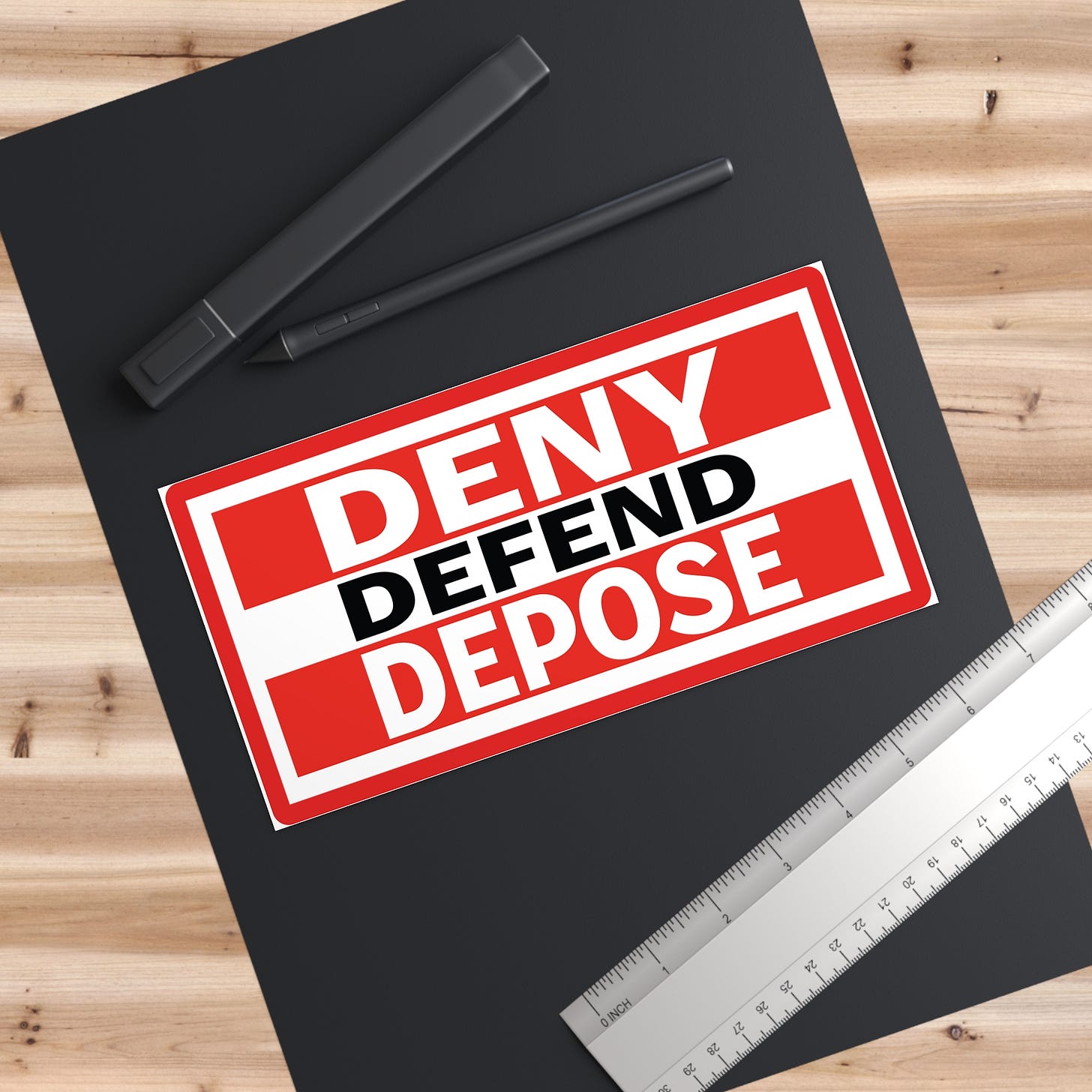The Story Behind the Deny Defend Depose Bumper Stickers
The phrase "Deny, Defend, Depose" recently made headlines after it was allegedly found written on shell casings at the scene of the tragic shooting of UnitedHealthcare CEO Brian Thompson in New York City.
SHOP HERE: Deny Defend Depose Bumper Stickers
These three words—denote, in the context of corporate culture, tactics insurance companies are accused of using to avoid paying claims.
Whether it’s denying legitimate claims, defending unethical practices, or deposing those who seek accountability, these actions represent a larger issue that has left many questioning the ethics of powerful corporations.
As soon as I heard about the incident, I was struck by the chilling resonance of the phrase. In the wake of such a horrifying event, these words reflect a dark truth about how some industries treat their customers. For many, "Deny, Defend, Depose" encapsulates the frustration that millions of people feel when they encounter bureaucratic red tape and corporate resistance. It's a sentiment rooted in the experience of those who've struggled with insurance companies—dealing with delayed payouts, unfair denials, or a lack of transparency. But this message is not just about the insurance industry. It’s a broader commentary on corporate power and the lengths some companies go to avoid scrutiny, leaving individuals to fend for themselves.
The design for the "Deny Defend Depose" bumper sticker was born out of this moment of realization. In a world where powerful organizations often avoid responsibility, this phrase needed to be shared, not just in headlines or legal discussions, but in a form that could inspire others to reflect and take action. The sticker serves as both an artistic expression and a tool for sparking a conversation about corporate accountability, ethics, and the need for systemic change.
The Design Process
The design is purposefully stark and bold. It uses large, uppercase lettering to emphasize the weight of the words. The simplicity of the design makes the message the focal point, without any distractions. The typography is modern yet serious, evoking a sense of urgency while remaining approachable. The black-and-white color scheme mirrors the seriousness of the topic, providing a contrast that ensures the message stands out wherever it's placed.
This bumper sticker isn’t just for cars; it’s a versatile statement piece that can be displayed on laptops, water bottles, notebooks—anywhere the message can catch someone’s eye. The vinyl used is durable and weather-resistant, ensuring that the message stays visible, rain or shine. This is a design built to last, just like the conversation it aims to provoke.
What Does "Deny, Defend, Depose" Mean?
At its core, "Deny, Defend, Depose" is a commentary on how some institutions prioritize profits over people. These words symbolize the tactics used to delay, dispute, and avoid accountability for actions that directly affect individuals' lives. While they were allegedly found in connection with a tragic event, their meaning transcends the context of the shooting, becoming a universal critique of corporate behavior that feels too common in today’s world.
The phrase is not just a criticism of the insurance industry—it’s a reflection of how corporate entities across various sectors often operate with little regard for the people they affect. It’s about making sure that the voices of those who suffer at the hands of these practices are heard, and that accountability becomes a driving force in reshaping these systems.
A Call for Change
The "Deny Defend Depose" bumper sticker is meant to spark change—not just in how we think about corporate practices, but in how we approach fairness and justice within systems of power. It’s a call to action, reminding us that as consumers, as citizens, and as individuals, we all have a role in pushing for transparency and accountability. This is a design that speaks to the ongoing conversation about corporate greed, social responsibility, and the importance of fighting for what’s right.
As the conversation around corporate practices continues to unfold, it’s my hope that this sticker—simple yet powerful—can contribute to the growing dialogue, encouraging others to think critically about the systems that shape our lives.




